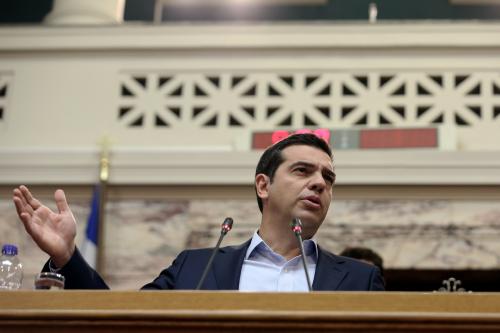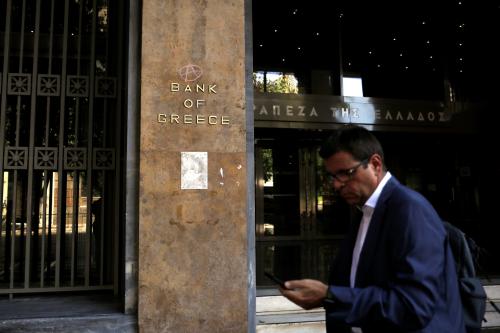The Greek crisis has become such a long and complicated case that sometimes writing about it makes Greece seem like an imaginary place. With technical staff from the International Monetary Fund, the European Commission (EC), the European Stability Mechanism (ESM), and the European Central Bank (ECB) set to return to Athens this week after a Eurogroup conclave agreed to resume talks with the Greek government, they amount to an awkward quartet that faces tough odds. Their mission is complicated for the following three reasons:
- First, all parties agree policy should shift away from austerity and toward growth enhancing reforms. However, this is too good to be true.
- Second, the pre-legislative measures by the government as agreed to by the Eurogroup should focus on pension cuts and a much lower threshold for tax-free income. Although these reforms amount to much-needed structural measures, they entail more austerity, which would exact a big political toll, with no guarantee that such immediate legislative action would pass.
- Third, according to the Greek government, the measures should a have zero fiscal impact. For every euro of burdensome measures, equivalent offsetting measures should be adopted (no way).
On the debt front, as promised by the Eurogroup back in 2012, successfully concluding the program—now projected to wrap up in August 2018—will entail further bond maturity extensions and lower and/or capped interest rates (known in the parlance as medium-term official sector involvement measures).
The Greek government asserts that an accord is not only feasible but almost certain in the next couple of weeks. But the creditors have to mention at least the first steps for a significant debt restructuring. Complicating this are the starkly different forecasts made by the IMF and the EC regarding whether or not Greece will meet its primary surplus target of 3.5 percent of GDP in 2018. The commission forecasts that Greece will meet the target readily, in line with its bailout requirements. By contrast, the IMF believes the surplus will be just 1.5 percent, making the budget balance before debt-servicing costs a source of contention. On top of that, disagreement persists over what surplus Athens can sustain in the 2018-2023 period. Thus, any rational person taking into account the mission’s “trilemma mandate” (whereby the ECB, IMF, and EC struggle to reach policy consensus) should reasonably have doubts about the talks. Something is wrong here.
The ultimate goal is, as the head of ESM Klaus Regling said recently in an interview, for Greece to borrow money from wholesale markets by the middle of 2018, which may make another bailout program unnecessary. Regling has also asserted something in a February 9 Financial Times interview that is completely at odds with the IMF’s view on the sustainability of the Greek debt, “…the actual cost to Greece of servicing its debt is among the lowest in Europe and will remain so for a long time.”
By contrast, in a February 22 meeting in Berlin with German Chancellor Angela Merkel, IMF head Christine Lagarde reiterated that, if the fund is to be involved in the program, a significant restructuring has to take place to make the Greek debt sustainable again and allow primary fiscal surpluses of significantly less than 3.5 percent of GDP.
National elections in both Germany and France could be factors in Greek Prime Minister Alex Tsipras’ tactics going forward. Tsipras may like to wait a bit and see how Martin Schulz, Chancellor Merkel’s political opponent (and former European Parliament President) who is definitely friendlier to the Greek government, is faring in the German polls. A possible surge of the National Front in France, a serious risk for the eurozone, could tempted Tsipras to press Europeans for a much better deal for him or even cancel the terms of the prospective agreement. In so doing, Tsipras could put the blame on the “others,” including the IMF, Europeans, liberal opposition parties in Greece, and so on, citing their austerity and lack of solidarity with the people.
There is plenty of speculation in Athens that Tsipras is playing the same game again, searching for a window to successfully refute the austerity-minded creditors and tell domestic voters that he is not going to accept more recessionary measures that will hurt poor Greek citizens. In this case, he may try to threaten Europeans in particular that Greece will not pay off the 3.8 billion euros in ECB bonds maturing next summer. He may then wait until July of this year to broker a better last minute deal. This is considered the most likely scenario for many here in Athens, especially from the vantage point of domestic liberal opposition forces.
Another more salutary outcome should not be ruled out. In a more positive scenario, despite austerity, the economy will haltingly recover this year and in 2018; Tsipras will undertake quantitative easing to lower interest rates and increase the money supply, and voters will be promised debt relief. But the most critical thing for him is to push the measures beyond 2018, a move that would proactively undermine New Democracy leader Kyriakos Mitsotakis, the opposition politician who is now very much ahead in the polls. Tsipras could then hope that Kyriakos will take the hard hit when austerity measures kick in in 2019. This would in turn give Tsipras a chance to make a comeback by taking advantage of the proportional electoral system he has recently legislated. Besides, voters usually seem to have a short memory.
The Brookings Institution is committed to quality, independence, and impact.
We are supported by a diverse array of funders. In line with our values and policies, each Brookings publication represents the sole views of its author(s).






Commentary
Creditors back in La La Land (Greece)
February 28, 2017